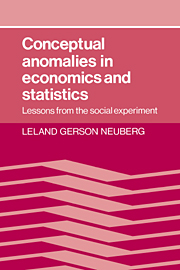Book contents
- Frontmatter
- Contents
- Preface
- Introduction
- PART I STATISTICAL LOGICS
- PART II ECONOMIC LOGICS
- Chapter 5 Problems with a rationalist account of classical mechanics
- Chapter 6 Microeconomics striving to be a classical-mechanics–like science
- Chapter 7 The income maintenance experiments: microeconomic science or scientism?
- Chapter 8 Microeconomics striving to be deontology
- Summary and conclusion of Part II
- Conclusion: Some possible barriers to controlled social experiments as science
- Appendix: Proofs of theorems, lemmas, and propositions
- References
- Symbols and abbreviations
- Index
Chapter 7 - The income maintenance experiments: microeconomic science or scientism?
Published online by Cambridge University Press: 16 February 2010
- Frontmatter
- Contents
- Preface
- Introduction
- PART I STATISTICAL LOGICS
- PART II ECONOMIC LOGICS
- Chapter 5 Problems with a rationalist account of classical mechanics
- Chapter 6 Microeconomics striving to be a classical-mechanics–like science
- Chapter 7 The income maintenance experiments: microeconomic science or scientism?
- Chapter 8 Microeconomics striving to be deontology
- Summary and conclusion of Part II
- Conclusion: Some possible barriers to controlled social experiments as science
- Appendix: Proofs of theorems, lemmas, and propositions
- References
- Symbols and abbreviations
- Index
Summary
Introduction: Science and scientism in microeconomics
Let “ideal science” be the reconstruction of science as predictions deduced from theory and tested by observations. In Chapter 5 we argued that classical mechanics, though science, failed as “ideal science” because of a set of attachment difficulties. In Chapter 6, with hypothetical particular utility and production functions, we argued that microeconomics failed as “ideal science” because of precisely the same set of attachment difficulties. Therefore, there exist utility and production functions which make microeconomics into a scientific research program in precisely the same way in which classical mechanics is a scientific research program.
Yet in Chapter 5 we also argued that classical mechanics is a successful scientific research program. That is, we exhibited particular force equations for various situations in the world. And we argued that in each such situation the conjunction of the particular force equation and Newton's Second Law implied a prediction statement which, ignoring the attachment difficulties, would confront and fail to be contradicted by actual observations. In Chapter 6, though, we made no claim that our hypothetical utility and production functions characterized any situation in the world or that their hypothetical prediction statements succeeded in confronting and failed to be contradicted by actual observations. Our account of microeconomics is so far one of an undeveloped, nonmature, or not yet successful scientific research program.
- Type
- Chapter
- Information
- Conceptual Anomalies in Economics and StatisticsLessons from the Social Experiment, pp. 182 - 245Publisher: Cambridge University PressPrint publication year: 1989

